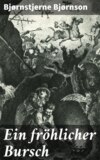Buch lesen: «Arne; Early Tales and Sketches», Seite 11
CHAPTER III
Lars moved about in the large rooms at Högstad, without speaking a word. His wife, who loved him, but always in fear and trembling, dared not come into his presence. The management of the gard and of the house might be carried on as best it could, while on the other hand there kept growing a multitude of letters, which passed back and forth between Högstad and the parish, and Högstad and the post-office; for Lars had claims against the parish board, and these not being satisfied he prosecuted; against the savings-bank, which were also unsatisfied, and so resulted in another suit. He took offense at expressions in the letters he received and went to law again, now against the chairman of the parish board, now against the president of the savings-bank. At the same time there were dreadful articles in the newspapers, which report attributed to him, and which were the cause of great dissension in the parish, inciting neighbor against neighbor. Sometimes he was absent whole weeks, no one knew where, and when he returned he lived as secluded as before. At church he had not been seen after the great scene at the representatives' meeting.
Then one Saturday evening the priest brought tidings that the railroad was to run through the parish after all, and across the old churchyard! It struck like lightning into every home. The unanimous opposition of the parish board had been in vain, Lars Högstad's influence had been stronger. This was the meaning of his journeys, this was his work! Involuntary admiration of the man and his stubborn persistence tended to suppress the dissatisfaction of the people at their own defeat, and the more they discussed the matter the more reconciled they became; for a fact accomplished always contains within itself reasons why it is so, which gradually force themselves upon us after there is no longer possibility of change. The people assembled about the church the next day, and they could not help laughing as they met one another. And just as the whole congregation, young and old, men and women, aye, even children, were all talking about Lars Högstad, his ability, his rigorous will, his immense influence, he himself with his whole household came driving up in four conveyances, one after the other. It was two years since his last visit there! He alighted and passed through the crowd, while all, as by one impulse, unhesitatingly greeted him, but he did not deign to bestow a glance on either side, nor to return a single salutation. His little wife, pale as death, followed him. Inside of the church, the astonishment grew to such a pitch that as one after another caught sight of him they stopped singing and only stared at him. Knud Aakre, who sat in his pew in front of Lars, noticed that there was something the matter, and as he perceived nothing remarkable in front of him, he turned round. He saw Lars bowed over his hymn-book, searching for the place.
He had not seen him since that evening at the meeting, and such a complete change he had not believed possible. For this was no victor! The thin, soft hair was thinner than ever, the face was haggard and emaciated, the eyes hollow and bloodshot, the giant neck had dwindled into wrinkles and cords. Knud comprehended at a glance what this man had gone through; he was seized with a feeling of strong sympathy, indeed, he felt something of the old love stirring within his breast. He prayed for Lars to his God, and made a resolute vow that he would seek him after service; but Lars had started on ahead. Knud resolved to call on him that evening. His wife, however, held him back.
"Lars is one of those," said she, "who can scarcely bear a debt of gratitude: keep away from him until he has an opportunity to do you some favor, and then perhaps he will come to you!"
But he did not come. He appeared now and then at church, but nowhere else, and he associated with no one. On the other hand, he now devoted himself to his gard and other business with the passionate zeal of one who had determined to make amends in one year for the neglect of many; and, indeed, there were those who said that this was imperative.
Railroad operations in the valley began very soon. As the line was to go directly past Lars's gard, he tore down the portion of his house that faced the road, in order to build a large and handsome balcony, for he was determined that his gard should attract attention. This work was just being done when the temporary rails for the conveyance of gravel and timber to the road were laid and a small locomotive was sent to the spot. It was a beautiful autumn evening that the first gravel car was to pass over the road. Lars stood on his front steps, to hear the first signal and to see the first column of smoke; all the people of the gard were gathered about him. He gazed over the parish, illumined by the setting sun, and he felt that he would be remembered as long as a train should come roaring through this fertile valley. A sense of forgiveness glided into his soul. He looked toward the churchyard, a part of which still remained, with crosses bowed down to the ground, but a part of it was now the railroad. He was just endeavoring to define his own feeling when the first signal whistled, and presently the train came slowly working its way along, attended by a cloud of smoke, mingled with sparks, for the locomotive was fed with pine wood. The wind blew toward the house so that those standing without were soon enveloped in a dense smoke, but as this cleared away Lars saw the train working its way down through the valley like a strong will.
He was content, and entered his house like one who has come from a long day's work. The image of his grandfather stood before him at this moment. This grandfather had raised the family from poverty to prosperity; true, a portion of his honor as a citizen was consumed in the act, but he had advanced nevertheless! His faults were the prevailing ones of his time: they were based on the uncertain boundary lines of the moral conceptions of his day. Every age has its uncertain moral distinctions and its victims to the endeavor to define them properly.
Honor be to him in his grave, for he had suffered and toiled! Peace be with him! It must be good to rest in the end. But he was not allowed to rest because of his grandson's vast ambition; his ashes were thrown up with the stones and the gravel. Nonsense! he would only smile that his grandson's work passed over his head.
Amid thoughts like these Lars had undressed and gone to bed. Once more his grandfather's image glided before him. It was sterner now than the first time. Weariness enfeebles us, and Lars began to reproach himself. But he defended himself also. What did his grandfather want? Surely he ought to be satisfied now, for the family honor was proclaimed in loud tones above his grave. Who else had such a monument? And yet what is this? These two monstrous eyes of fire and this hissing, roaring sound belong no longer to the locomotive, for they turn away from the railroad track. And from the churchyard straight toward the house comes an immense procession. The eyes of fire are his grandfather's, and the long line of followers are all the dead. The train advances steadily toward the gard, roaring, crackling, flashing. The windows blaze in the reflection of the dead men's eyes. Lars made a mighty effort to control himself, for this was a dream, unquestionably but a dream. Only wait until I am awake! There, now I am awake. Come on, poor ghosts!
And lo! they really did come from the churchyard, overthrowing road, rails, locomotive and train, so that these fell with a mighty crash to the ground, and the green sod appeared in their stead, dotted with graves and crosses as before. Like mighty champions they advanced, and the hymn, "Let the dead repose in peace!" preceded them. Lars knew it; for through all these years it had been sighing within his soul, and now it had become his requiem; for this was death and death's visions. The cold sweat started out over his whole body, for nearer and nearer – and behold, on the window pane! there they are now, and he heard some one speak his name. Overpowered with dread he struggled to scream; for he was being strangled, a cold hand was clinching his throat and he regained his voice in an agonized: "Help me!" and awoke. The window had been broken in from the outside; the pieces flew all about his head. He sprang up. A man stood at the window, surrounded by smoke and flames.
"The gard is on fire, Lars! We will help you out!"
It was Knud Aakre.
When Lars regained his consciousness, he was lying outside in a bleak wind, which chilled his limbs. There was not a soul with him; he saw the flaming gard to the left; around him his cattle were grazing and making their voices heard; the sheep were huddled together in a frightened flock; the household goods were scattered about, and when he looked again he saw some one sitting on a knoll close by, weeping. It was his wife. He called her by name. She started.
"The Lord Jesus be praised that you are alive!" cried she, coming forward and seating herself, or rather throwing herself down in front of him. "O God! O God! We surely have had enough of this railroad now!"
"The railroad?" asked he, but ere the words had escaped his lips, a clear comprehension of the case passed like a shudder over him; for, of course, sparks from the locomotive that had fallen among the shavings of the new side wall had been the cause of the fire. Lars sat there brooding in silence; his wife, not daring to utter another word, began to search for his clothes; for what she had spread over him, as he lay senseless, had fallen off. He accepted her attentions in silence, but as she knelt before him to cover his feet, he laid his hand on her head. Falling forward she buried her face in his lap and wept aloud. There were many who eyed her curiously. But Lars understood her and said, —
"You are the only friend I have."
Even though it had cost the gard to hear these words, it mattered not to her; she felt so happy that she gained courage, and rising up and looking humbly into her husband's face, she said, —
"Because there is no one else who understands you."
Then a hard heart melted, and tears rolled down the man's cheeks as he clung to his wife's hand.
Now he talked to her as to his own soul. Now too she opened to him her mind. They also talked about how all this had happened, or rather he listened while she told about it. Knud Aakre had been the first to see the fire, had roused his people, sent the girls out over his parish, while he had hastened himself with men and horses to the scene of the conflagration, where all were sleeping. He had engineered the extinguishing of the flames and the rescuing of the household goods, and had himself dragged Lars from the burning room, and carried him to the left side of the house from where the wind was blowing and had laid him out here in the churchyard.
And while they were talking of this, some one came driving rapidly up the road and turned into the churchyard, where he alighted. It was Knud, who had been home after his church-cart, – the one in which they had so many times ridden together to and from the meetings of the parish board. Now he requested Lars to get in and ride home with him. They grasped each other by the hand, the one sitting, the other standing.
"Come with me now," said Knud.
Without a word of reply, Lars rose. Side by side they walked to the cart. Lars was helped in; Knud sat down beside him. What they talked about as they drove along, or afterwards in the little chamber at Aakre, where they remained together until late in the morning, has never been known. But from that day they were inseparable as before.
As soon as misfortune overtakes a man, every one learns what he is worth. And so the parish undertook to rebuild Lars Högstad's houses, and to make them larger and handsomer than any others in the valley. He was reëlected chairman, but with Knud Aakre at his side; he never again failed to take counsel of Knud's intelligence and heart – and from that day forth nothing went to ruin.
THROND
There was once a man named Alf, who had raised great expectations among his fellow-parishioners because he excelled most of them both in the work he accomplished and in the advice he gave. Now when this man was thirty years old, he went to live up the mountain and cleared a piece of land for farming, about fourteen miles from any settlement. Many people wondered how he could endure thus depending on himself for companionship, but they were still more astonished when, a few years later, a young girl from the valley, and one, too, who had been the gayest of the gay at all the social gatherings and dances of the parish, was willing to share his solitude.
This couple were called "the people in the wood," and the man was known by the name "Alf in the wood." People viewed him with inquisitive eyes when they met him at church or at work, because they did not understand him; but neither did he take the trouble to give them any explanation of his conduct. His wife was only seen in the parish twice, and on one of these occasions it was to present a child for baptism.
This child was a son, and he was called Thrond. When he grew larger his parents often talked about needing help, and as they could not afford to take a full-grown servant, they hired what they called "a half: " they brought into their house a girl of fourteen, who took care of the boy while the father and mother were busy in the field.
This girl was not the brightest person in the world, and the boy soon observed that his mother's words were easy to comprehend, but that it was hard to get at the meaning of what Ragnhild said. He never talked much with his father, and he was rather afraid of him, for the house had to be kept very quiet when he was at home.
One Christmas Eve – they were burning two candles on the table, and the father was drinking from a white flask – the father took the boy up in his arms and set him on his lap, looked him sternly in the eyes and exclaimed, —
"Ugh, boy!" Then he added more gently: "Why, you are not so much afraid. Would you have the courage to listen to a story?"
The boy made no reply, but he looked full in his father's face. His father then told him about a man from Vaage, whose name was Blessom. This man was in Copenhagen for the purpose of getting the king's verdict in a law-suit he was engaged in, and he was detained so long that Christmas Eve overtook him there. Blessom was greatly annoyed at this, and as he was sauntering about the streets fancying himself at home, he saw a very large man, in a white, short coat, walking in front of him.
"How fast you are walking!" said Blessom.
"I have a long distance to go in order to get home this evening," replied the man.
"Where are you going?"
"To Vaage," answered the man, and walked on.
"Why, that is very nice," said Blessom, "for that is where I was going, too."
"Well, then, you may ride with me, if you will stand on the runners of my sledge," answered the man, and turned into a side street where his horse was standing.
He mounted his seat and looked over his shoulder at Blessom, who was just getting on the runners.
"You had better hold fast," said the stranger.
Blessom did as he was told, and it was well he did, for their journey was evidently not by land.
"It seems to me that you are driving on the water," cried Blessom.
"I am," said the man, and the spray whirled about them.
But after a while it seemed to Blessom their course no longer lay on the water.
"It seems to me we are moving through the air," said he.
"Yes, so we are," replied the stranger.
But when they had gone still farther, Blessom thought he recognized the parish they were driving through.
"Is not this Vaage?" cried he.
"Yes, now we are there," replied the stranger, and it seemed to Blessom that they had gone pretty fast.
"Thank you for the good ride," said he.
"Thanks to yourself," replied the man, and added, as he whipped up his horse, "Now you had better not look after me."
"No, indeed," thought Blessom, and started over the hills for home.
But just then so loud and terrible a crash was heard behind him that it seemed as if the whole mountain must be tumbling down, and a bright light was shed over the surrounding landscape; he looked round and beheld the stranger in the white coat driving through the crackling flames into the open mountain, which was yawning wide to receive him, like some huge gate. Blessom felt somewhat strange in regard to his traveling companion; and thought he would look in another direction; but as he had turned his head so it remained, and never more could Blessom get it straight again.
The boy had never heard anything to equal this in all his life. He dared not ask his father for more, but early the next morning he asked his mother if she knew any stories. Yes, of course she did; but hers were chiefly about princesses who were in captivity for seven years, until the right prince came along. The boy believed that everything he heard or read about took place close around him.
He was about eight years old when the first stranger entered their door one winter evening. He had black hair, and this was something Thrond had never seen before. The stranger saluted them with a short "Good-evening!" and came forward. Thrond grew frightened and sat down on a cricket by the hearth. The mother asked the man to take a seat on the bench along the wall; he did so, and then the mother could examine his face more closely.
"Dear me! is not this Knud the fiddler?" cried she.
"Yes, to be sure it is. It has been a long time since I played at your wedding."
"Oh, yes; it is quite a while now. Have you been on a long journey?"
"I have been playing for Christmas, on the other side of the mountain. But half way down the slope I began to feel very badly, and I was obliged to come in here to rest."
The mother brought forward food for him; he sat down to the table, but did not say "in the name of Jesus," as the boy had been accustomed to hear. When he had finished eating, he got up from the table, and said, —
"Now I feel very comfortable; let me rest a little while."
And he was allowed to rest on Thrond's bed.
For Thrond a bed was made on the floor. As the boy lay there, he felt cold on the side that was turned away from the fire, and that was the left side. He discovered that it was because this side was exposed to the chill night air; for he was lying out in the wood. How came he in the wood? He got up and looked about him, and saw that there was fire burning a long distance off, and that he was actually alone in the wood. He longed to go home to the fire; but could not stir from the spot. Then a great fear overcame him; for wild beasts might be roaming about, trolls and ghosts might appear to him; he must get home to the fire; but he could not stir from the spot. Then his terror grew, he strove with all his might to gain self-control, and was at last able to cry, "Mother," and then he awoke.
"Dear child, you have had bad dreams," said she, and took him up.
A shudder ran through him, and he glanced round. The stranger was gone, and he dared not inquire after him.
His mother appeared in her black dress, and started for the parish. She came home with two new strangers, who also had black hair and who wore flat caps. They did not say "in the name of Jesus," when they ate, and they talked in low tones with the father. Afterward the latter and they went into the barn, and came out again with a large box, which the men carried between them. They placed it on a sled, and said farewell. Then the mother said: —
"Wait a little, and take with you the smaller box he brought here with him."
And she went in to get it. But one of the men said, —
"He can have that," and he pointed at Thrond.
"Use it as well as he who is now lying here," added the other stranger, pointing at the large box.
Then they both laughed and went on. Thrond looked at the little box which thus came into his possession.
"What is there in it?" asked he.
"Carry it in and find out," said the mother.
He did as he was told, but his mother helped him open it. Then a great joy lighted up his face; for he saw something very light and fine lying there.
"Take it up," said his mother.
He put just one finger down on it, but quickly drew it back again, in great alarm.
"It cries," said he.
"Have courage," said his mother, and he grasped it with his whole hand and drew it forth from the box.
He weighed it and turned it round, he laughed and felt of it.
"Dear me! what is it?" asked he, for it was as light as a toy.
"It is a fiddle."
This was the way that Thrond Alfson got his first violin.
The father could play a little, and he taught the boy how to handle the instrument; the mother could sing the tunes she remembered from her dancing days, and these the boy learned, but soon began to make new ones for himself. He played all the time he was not at his books; he played until his father once told him he was fading away before his eyes. All the boy had read and heard until that time was put into the fiddle. The tender, delicate string was his mother; the one that lay close beside it, and always accompanied his mother, was Ragnhild. The coarse string, which he seldom ventured to play on, was his father. But of the last solemn string he was half afraid, and he gave no name to it. When he played a wrong note on the E string, it was the cat; but when he took a wrong note on his father's string, it was the ox. The bow was Blessom, who drove from Copenhagen to Vaage in one night. And every tune he played represented something. The one containing the long solemn tones was his mother in her black dress. The one that jerked and skipped was like Moses, who stuttered and smote the rock with his staff. The one that had to be played quietly, with the bow moving lightly over the strings, was the hulder in yonder fog, calling together her cattle, where no one but herself could see.
But the music wafted him onward over the mountains, and a great yearning took possession of his soul. One day when his father told about a little boy who had been playing at the fair and who had earned a great deal of money, Thrond waited for his mother in the kitchen and asked her softly if he could not go to the fair and play for people.
"Who ever heard of such a thing!" said his mother; but she immediately spoke to his father about it.
"He will get out into the world soon enough," answered the father; and he spoke in such a way that the mother did not ask again.
Shortly after this, the father and mother were talking at table about some new settlers who had recently moved up on the mountain and were about to be married. They had no fiddler for the wedding, the father said.
"Could not I be the fiddler?" whispered the boy, when he was alone in the kitchen once more with his mother.
"What, a little boy like you?" said she; but she went out to the barn where his father was and told him about it.
"He has never been in the parish," she added, "he has never seen a church."
"I should not think you would ask about such things," said Alf; but neither did he say anything more, and so the mother thought she had permission. Consequently she went over to the new settlers and offered the boy's services.
"The way he plays," said she, "no little boy has ever played before;" and the boy was to be allowed to come.
What joy there was at home! Thrond played from morning until evening and practiced new tunes; at night he dreamed about them: they bore him far over the hills, away to foreign lands, as though he were afloat on sailing clouds. His mother made a new suit of clothes for him; but his father would not take part in what was going on.
The last night he did not sleep, but thought out a new tune about the church which he had never seen. He was up early in the morning, and so was his mother, in order to get him his breakfast, but he could not eat. He put on his new clothes and took his fiddle in his hand, and it seemed to him as though a bright light were glowing before his eyes. His mother accompanied him out on the flag-stone, and stood watching him as he ascended the slopes; – it was the first time he had left home.
His father got quietly out of bed and walked to the window; he stood there following the boy with his eyes until he heard the mother out on the flag-stone, then he went back to bed and was lying down when she came in.
She kept stirring about him, as if she wanted to relieve her mind of something. And finally it came out: —
"I really think I must walk down to the church and see how things are going."
He made no reply, and therefore she considered the matter settled, dressed herself and started.
It was a glorious, sunny day, the boy walked rapidly onward; he listened to the song of the birds and saw the sun glittering among the foliage, while he proceeded on his way, with his fiddle under his arm. And when he reached the bride's house, he was still so occupied with his own thoughts, that he observed neither the bridal splendor nor the procession; he merely asked if they were about to start, and learned that they were. He walked on in advance with his fiddle, and he played the whole morning into it, and the tones he produced resounded through the trees.
"Will we soon see the church?" he asked over his shoulder.
For a long time he received only "No" for an answer, but at last some one said:
"As soon as you reach that crag yonder, you will see it."
He threw his newest tune into the fiddle, the bow danced on the strings, and he kept his eyes fixed intently before him. There lay the parish right in front of him!
The first thing he saw was a little light mist, curling like smoke on the opposite mountain side. His eyes wandered over the green meadow and the large houses, with windows which glistened beneath the scorching rays of the sun, like the glacier on a winter's day. The houses kept increasing in size, the windows in number, and here on one side of him lay the enormous red house, in front of which horses were tied; little children were playing on a hill, dogs were sitting watching them. But everywhere there penetrated a long, heavy tone, that shook him from head to foot, and everything he saw seemed to vibrate with that tone. Then suddenly he saw a large, straight house, with a tall, glittering staff reaching up to the skies. And below, a hundred windows blazed, so that the house seemed to be enveloped in flames. This must be the church, the boy thought, and the music must come from it! Round about stood a vast multitude of people, and they all looked alike! He put them forthwith into relations with the church, and thus acquired a respect mingled with awe for the smallest child he saw.
"Now I must play," thought Thrond, and tried to do so.
But what was this? The fiddle had no longer any sound in it. There must be some defect in the strings; he examined, but could find none.
"Then it must be because I do not press on hard enough," and he drew his bow with a firmer hand; but the fiddle seemed as if it were cracked.
He changed the tune that was meant to represent the church into another, but with equally bad results; no music was produced, only squeaking and wailing. He felt the cold sweat start out over his face, he thought of all these wise people who were standing here and perhaps laughing him to scorn, this boy who at home could play so beautifully but who here failed to bring out a single tone!
"Thank God that mother is not here to see my shame!" said he softly to himself, as he played among the people; but lo! there she stood, in her black dress, and she shrank farther and farther away.
At that moment he beheld far up on the spire, the black-haired man who had given him the fiddle. "Give it back to me," he now shouted, laughing and stretching out his arms, and the spire went up and down with him, up and down. But the boy took the fiddle under one arm, screaming, "You shall not have it!" and turning, ran away from the people, beyond the houses, onward through meadow and field, until his strength forsook him, and then sank to the ground.
There he lay for a long time, with his face toward the earth, and when finally he looked round he saw and heard only God's infinite blue sky that floated above him, with its everlasting sough. This was so terrible to him that he had to turn his face to the ground again. When he raised his head once more his eyes fell on his fiddle, which lay at his side.
"This is all your fault!" shouted the boy, and seized the instrument with the intention of dashing it to pieces, but hesitated as he looked at it.
"We have had many a happy hour together," said he, then paused. Presently he said: "The strings must be severed, for they are worthless." And he took out a knife and cut. "Oh!" cried the E string, in a short, pained tone. The boy cut. "Oh!" wailed the next; but the boy cut. "Oh!" said the third, mournfully; and he paused at the fourth. A sharp pain seized him; that fourth string, to which he never dared give a name, he did not cut. Now a feeling came over him that it was not the fault of the strings that he was unable to play, and just then he saw his mother walking slowly up the slope toward where he was lying, that she might take him home with her. A greater fright than ever overcame him; he held the fiddle by the severed strings, sprang to his feet, and shouted down to her, —
"No, mother! I will not go home again until I can play what I have seen to-day."




















